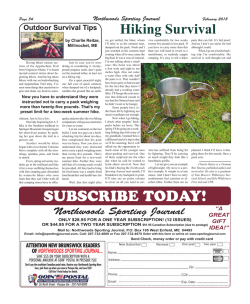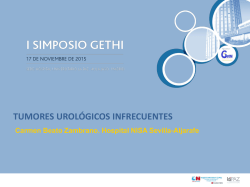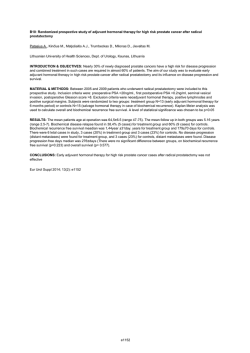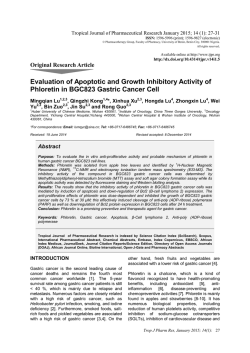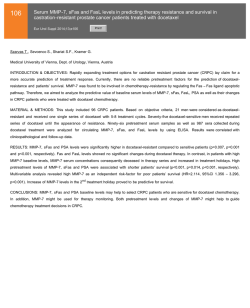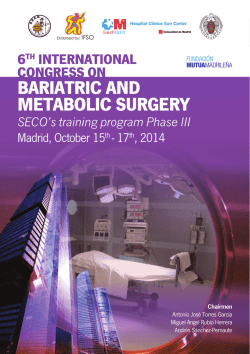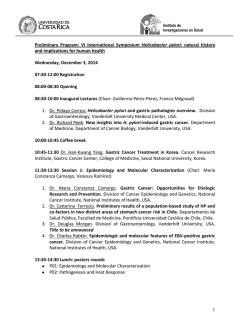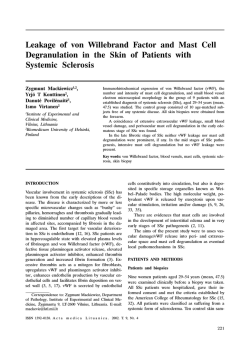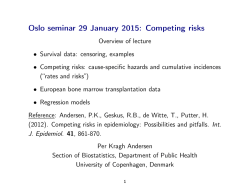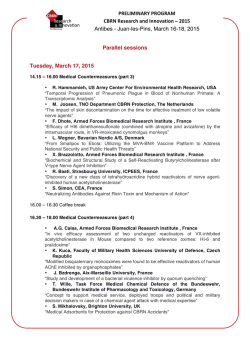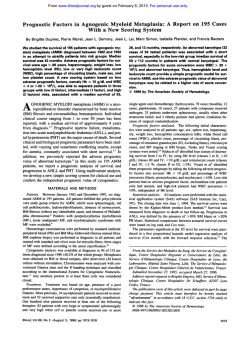
AB SCIENCE PR ASCO P2 gastric v0 5 ENG
Paris, 2 February 2015, 5.40 pm AB Science Reports Positive Phase 2 Clinical Study Data of Masitinib in Second-Line Metastatic Stomach Cancer Confirmatory Phase 3 Clinical Trial Planned AB Science SA (NYSE Euronext - FR0010557264 - AB), a pharmaceutical company specializing in the research, development and commercialization of protein kinase inhibitors (PKIs), today announced encouraging efficacy and safety results from a phase 2 study with its investigational drug, masitinib, in patients with nonresectable, metastatic esophagogastric adenocarcinoma after progression to first-line treatment. This was a prospective, multicenter, open-label, randomized, uncontrolled, phase 1b/2 study to evaluate efficacy and safety of masitinib in association with chemotherapy for the treatment of recurrent gastric or gastro-esophageal junction adenocarcinoma. Patients received masitinib in combination with irinotecan, or FOLFIRI (irinotecan, 5-fluorouracil and folinic acid), or 5-fluorouracil, after progression to platinum-based first-line chemotherapy. • In the masitinib plus irinotecan treatment-arm, median overall survival (OS) and progression-free survival (PFS) were 13.4 and 3.9 months, respectively. Safety data showed that the combination of masitinib and irinotecan had an acceptable safety profile. • In the masitinib plus FOLFIRI treatment-arm, median OS and PFS were 10.9 and 2.4 months, respectively. Again, safety data showed that the combination of masitinib and FOLFIRI had an acceptable safety profile. • The masitinib plus 5-fluorouracil treatment-arm was closed early due to lack of efficacy on PFS. Full safety and efficacy data has been submitted for publication to the American Society of Clinical Oncology (ASCO) 2015 Annual Meeting. The efficacy of masitinib in combination with irinotecan compares favorably to numerous published results for second-line irinotecan treatment. The median OS for single-agent irinotecan has been reported at approximately 7.5 months (meta-analysis based on seven studies1). Based on the efficacy data generated from this phase 2 study and the acceptable safety profile of masitinib, AB Science intends to conduct a confirmatory phase 3 trial evaluating masitinib at 6 mg/kg/day in combination with irinotecan in secondline. “The phase 2 efficacy results of masitinib in combination with irinotecan for the treatment of metastatic second-line stomach cancer are quite encouraging,” said Professor Julien Taieb of Hôpital Européen Georges Pompidou, Paris, France, and the principal investigator of this study. “A significant unmet medical need still exists for progressive metastatic stomach cancer, and the development of targeted agents such as masitinib has an increasingly important role in extending survival for these patients. Findings from the recently completed study justify further comparative phase 3 investigation of masitinib-based combinations, and if the observed survival benefit is confirmed, then masitinib could potentially offer patients a new effective compound for this disease.” “Increased mast cell activity in the tumor microenvironment of gastric cancer has been linked to poor prognosis for some time,” said Professor Olivier Hermine, President of the Scientific Committee of AB Page 1/3 Science. “This link has been substantiated by recent research demonstrating mast cells to be the primary source of interleukin-17 (IL-17) in gastric cancer, with IL-17 being attributed with suppressing effective antitumor immune responses and promoting tumor progression by enhancing angiogenesis in the tumor microenvironment2. Masitinib’s highly effective inhibition of mast cell function, therefore, has the potential to effectively control intratumor IL-17 infiltration, and consequently reverse immunosuppression in the tumor microenvironment. Moreover, masitinib acts as an immune therapy through alternative mechanisms of action, the benefit of which is to extend survival by controlling the aggressiveness, transformation and dissemination of the tumors. Together, these mechanisms of action represent a strong biological rationale for the further development of masitinib in this indication.” According to the GLOBOCAN 2012 estimate of worldwide cancer burden, stomach cancer is the fifth most commonly diagnosed cancer globally and the third leading cause of cancer death3. The most common type of stomach cancer is adenocarcinoma, accounting for at least 90% of all stomach cancers. The incidence of stomach cancer is reported at approximately 100,000 patients in the USA and European Union, with a mortality rate of approximately 70,000 patients4. Approximately 90% of patients present with metastatic disease in either regional or distant sites and it is estimated that 60% of patients progressing after first-line treatment of metastatic cancer can receive a second-line of treatment. Based on these estimates, the number of eligible patients for second-line treatment of metastatic esophagogastric adenocarcinoma is 50,000 patients per annum in the USA and Europe. 1 References from meta-analysis [1] Thuss-Patience PC et al,. Eur J Cancer. 2011 Oct, 47(15):2306-14. [2] Kang JH et al,. J Clin Oncol. 2012 May 1, 30(13):1513-8. [3] Higuchi K et al,. Eur J Cancer. 2014 May, 50(8):1437-45. [4] Satoh T et al,. Gastric Cancer. 2014 Sep 5. [5] Roy AC et al,. Ann Oncol. 2013 Jun, 24(6):1567-73. [6] Kucukzeybek Y et al,. Asian Pac J Cancer Prev. 2012, 13(6):2771-4. [7] Oba M et al,. Oncol Lett. 2011 Mar, 2(2):247-251. 2 Liu X, et al. (2014) Intratumor IL-17-Positive Mast Cells Are the Major Source of the IL-17 That Is Predictive of Survival in Gastric Cancer Patients. PLoS ONE 9(9): e106834 3 http://globocan.iarc.fr/Pages/fact_sheets_cancer.aspx 4 www.cancer.gov/cancertopics/pdq/treatment/gastric/HealthProfessional; http://eco.iarc.fr/eucan/; http://seer.cancer.gov/statfacts/ ; Status of masitinib clinical development in human medicine Masitinib is currently developed in 13 phase III indications; 7 in oncology, 3 in inflammatory diseases, and 3 in neurodegenerative diseases. Additionally, a large phase II clinical program is ongoing, mainly in oncology. In case of positive results, phase III studies will be initiated following these phase II studies. Overall, clinical development has been initiated in more than 30 countries, without any licensing agreement. Therefore, AB Science has retained full ownership of masitinib. About masitinib Masitinib is a new orally administered tyrosine kinase inhibitor that targets mast cells and macrophages, important cells for immunity, through inhibiting a limited number of kinases. Based on its unique mechanism of action, masitinib can be developed in a large number of conditions in oncology, in inflammatory diseases, and in certain diseases of the central nervous system. In oncology due to its immunotherapy effect, masitinib can have an effect on survival, alone or in combination with chemotherapy. Through its activity on mast cells and consequently the inhibition of the activation of the inflammatory process, masitinib can have an effect on the symptoms associated with some inflammatory and central nervous system diseases and the degeneration of these diseases. About AB Science Founded in 2001, AB Science is a pharmaceutical company specializing in the research, development and commercialization of protein kinase inhibitors (PKIs), a class of targeted proteins whose action are key in signaling Page 2/3 pathways within cells. Our programs target only diseases with high unmet medical needs, often lethal with short term survival or rare or refractory to previous line of treatment in cancers, inflammatory diseases, and central nervous system diseases, both in humans and animal health. AB Science has developed a proprietary portfolio of molecules and the Company’s lead compound, masitinib, has already been registered for veterinary medicine in Europe and in the USA. The company is currently pursuing thirteen phase 3 studies in human medicine in first-line and second-line GIST, metastatic melanoma expressing JM mutation of c-Kit, multiple myeloma, metastatic colorectal cancer, metastatic prostate cancer, pancreatic cancer, mastocytosis, severe persistent asthma, rheumatoid arthritis, Alzheimer’s disease, progressive forms of multiple sclerosis, and Amyotrophic Lateral Sclerosis. The company is headquartered in Paris, France, and listed on Euronext Paris (ticker: AB). Further information is available on AB Science website: www.ab-science.com. This document contains prospective information. No guarantee can be given as for the realization of these forecasts, which are subject to those risks described in documents deposited by the Company to the Authority of the financial markets, including trends of the economic conjuncture, the financial markets and the markets on which AB Science is present. * * * AB Science – Financial Communication & Media Relations [email protected] Page 3/3
© Copyright 2026
